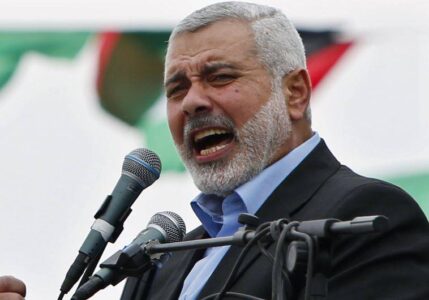
Hamas leader Ismail Haniyeh hails Qatar’s support for Palestine
Chairman of the Hamas Political Bureau Ismail Haniyeh hailed Qatar’s role in supporting the Palestinian cause regionally and internationally, stressing that Qatar utilized its capabilities to support the Palestinian people.
Haniyeh said, during an interview with Qatari newspapers, that the Palestinian people recognize the supportive position of Qatar, especially during the crises experienced the past years, pointing out the distinct Qatari diplomacy in the supportive Arab and Islamic positions for the Palestinian cause, as it is the first country to support the Palestinian people internally and externally.
He explained that the financial support provided by Qatar over the past years to help the Palestinian people continues to this day, as Qatar has contributed financial support that amounted to $ 180 million in the past year alone, which helped the reconstruction of 10,000 homes that were destroyed in wars in Gaza. He stated that the Qatari Reconstruction Committee is responsible for managing all projects in Gaza.
Haniyeh called for the necessity of lifting the unjust blockade imposed on Qatar in the interest of the region and restoring unity to face the challenges. He hailed Doha’s ability to overcome the effects of this blockade, as Qatar has become a State of strategic stability, capable of coexisting with the changes in the region.
He stressed that the developments that the Palestinian issue is going through at this stage are the most dangerous since the conflict began with the Zionist occupation in 1948. He pointed out that the Zionist project was based on two main pillars: the first is the occupation of the land and the second is the expulsion of the Palestinian people. He added that they are facing an Israeli strategy that reflects itself in many plans and targets since the occupation of the land.
He clarified that the heart of this targeting is Jerusalem, whether in terms of occupation, Judaization or changing the Palestinian Arab-Islamic identity and isolating it from its Palestinian and Arab connection by intensifying settlements in Jerusalem.
He also said that there is the issue of settlement that has spread from the Palestinian territories since 1948 to the lands occupied in 1967. “Today we are talking about 750 thousand settlers living in the West Bank, half of them live in Jerusalem, and there are blocs called the major blocs of Israeli settlements that occupy 12 percent of the West Bank lands, in addition to the construction of the wall inside the lands of the West Bank.
This wall had very great repercussions on geography and demography, because it cut off the lands of a very large part of the West Bank in what was known as lands behind the wall,” he explained.
On the importance of arranging the Palestinian side from the inside and complete the reconciliation between Fatah and Hamas movements, Haniyeh said that they are building steps towards Palestinian reconciliation through a national dialogue, explaining that the current stage is more urgent to confront the recent changes caused by the Deal of the Century and the Israeli entity’s plan to annex parts of the occupied West Bank and the Jordan Valley.
Haniyeh pointed out that reinforcing the national project has three foundations, including agreement on a national basis and on the leadership for the Palestinian people, which is the Palestine Liberation Organization. “We do not offer a substitute for that organization, but it needs to be rebuilt,” he stated.
The third foundation is an agreement on the resistance strategy, whether diplomatic or armed. He added, “we are ready to sit at the same table and agree on how to exercise our national struggle to end the occupation.”
Source: Gulf Times





